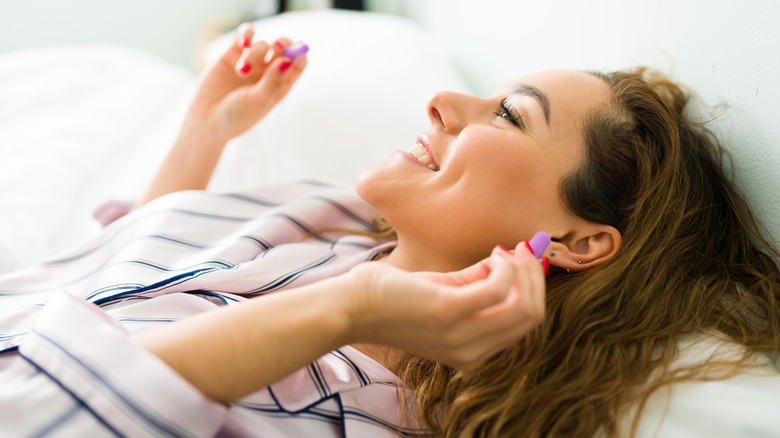If you live next to rowdy neighbors, have a partner who snores, or you’re just a light sleeper, you may have considered a variety of options to help you get a good night’s sleep. While some people opt for white noise machines or sleeping pills, others choose to go with earplugs as a simple and cost-effective sleep solution. But is it actually good for you to sleep with earplugs every night?
The importance of sleeping soundly cannot be underestimated. Between maintaining balancing your blood pressure, boosting your immune system, and helping your mind recover from stress, hitting the sack is crucial for both your mental and physical health (via Verywell Health).
Noise in the environment, whether it be a barking dog, crying baby, or a police siren, is one of the most common causes of interrupted sleep, according to 2024 research published in Sleep Science. When your sleep is disturbed, it impacts your ability to function in every way. Sleep deprivation impairs your cognitive functioning and is associated with heart disease, weight gain, and depression (via WebMD).
Pros and cons of sleeping with earplugs

Having your sleep disturbed doesn’t feel good and can be incredibly frustrating to deal with. Luckily, earplugs may provide an easy, cost-effective solution for a sound sleep.
A 2024 study published in the Iranian Journal of Nursing and Midwifery Research found that while noise was a big cause of sleep disturbances in ICU patients, using earplugs significantly improved participants’ sleep quality.
While earplugs may be the perfect solution for a good night’s sleep, there are potential side effects if you decide to use them. According to Healthline, using earplugs over a long period of time may cause ear wax to accumulate, leading to a possible infection. Neglecting to regularly clean or replace your earplugs could cause a buildup of bacteria which could also put you at risk for infection.
While there are many different types of earplugs on the market, the best and most comfortable kind for sleeping are ones made of foam and wax (via Healthline). You can feel free to use your earplugs nightly but to reduce your risk of infection, be sure to clean your earplugs regularly, insert them with clean hands, and replace your earplugs as needed.